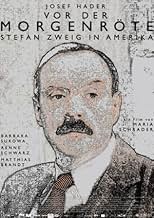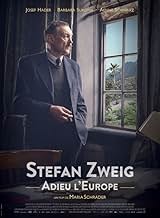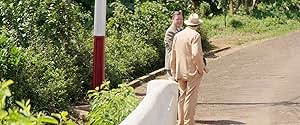IMDb-BEWERTUNG
6,7/10
2774
IHRE BEWERTUNG
"Vor der Morgenröte erzählt die Jahre im Exil des berühmten jüdisch-österreichischen Schriftstellers Stefan Zweig, seinen inneren Kampf um die ""richtige Einstellung"" gegenüber den Ereignis... Alles lesen"Vor der Morgenröte erzählt die Jahre im Exil des berühmten jüdisch-österreichischen Schriftstellers Stefan Zweig, seinen inneren Kampf um die ""richtige Einstellung"" gegenüber den Ereignissen im vom Krieg zerrissenen Europa und seine Suche nach einen neuen Zuhause.""Vor der Morgenröte erzählt die Jahre im Exil des berühmten jüdisch-österreichischen Schriftstellers Stefan Zweig, seinen inneren Kampf um die ""richtige Einstellung"" gegenüber den Ereignissen im vom Krieg zerrissenen Europa und seine Suche nach einen neuen Zuhause."
- Regie
- Drehbuch
- Hauptbesetzung
- Auszeichnungen
- 6 Gewinne & 10 Nominierungen insgesamt
Empfohlene Bewertungen
Josef Hader is one of the best actors you will ever see. Believe it. If you do not know anything about Zweig and if you want to see Hader acting, because you have not seen him before than go for this one. It is entertaining enough to sit it through somehow. And Hader is - as always - a magnet to the eyes. But apart from Haders's acting this movie is a disaster. Zweig's life has so much potential, but Maria Schrader decided to show Zweig's inner struggle with his emigration from Europe to America in 5 or 6 long snapshot-dialogues. And to deliver the message with everything what happened in Zweig's life, Schrader was forced to bend the talking in the dialogues in such a way that all information was said in some sort of everyday tittle-tattle between Zweig, his wives, and other people. So the movie gets very artificial and artistically forced. And so we got tired in our seats. It would have been much better to make a mock-documentary about Zweig (with Hader). Anyway, for lovers of great acting I recommend it, but only because of Hader's unmissable acting: to be honest, Hader could play an old sneaker resting for years in a shoe box and it would still be worthwhile seeing it.
10clanciai
This is a very sad film, but if the ambition was to give as correct and truthful a picture as possible of Stefan Zweig's exile dilemma, it has succeeded overwhelmingly well. The character of the film is as close to documentary as a feature film can be, it is almost overly realistic in catching every day life scenes of the author and his friends and family, and the introductory scenes in South America, especially the Pen conference in Buenos Aires in 1936 give insight enough into Stefan Zweig's public standing and views and his definite refusal to take any political standing at all. That was maybe his life's tragedy, he wanted to keep it pure of any commitment for or against any worldly state and ideology, but in the end he was forced to abandon his idealism to finally take a stand against nazism in his autobiography "The World of Yesterday" and his last work "Schachnovelle". That could be seen as a personal moral bankruptcy in giving up his idealistic view of humanity, and he committed his suicide almost directly after finishing the story. It was found after his death.
Of course, a film like this can't tell the whole truth but only give glimpses of it, but the glimpses are accurate and expressive enough and give a fairly good view of the whole picture. He actually contemplated suicide already much earlier in his career, he even asked his first wife Friederike to join him in suicide, but she had her two daughters (from a previous marriage) to live for, while his second wife was free to join him.
It's a beautiful picture for its infinite melancholy expressed only in suggestions but giving a very accurate interpretation of the very complex and tragic case of Stefan Zweig, who was the greatest writer of his time.
Of course, a film like this can't tell the whole truth but only give glimpses of it, but the glimpses are accurate and expressive enough and give a fairly good view of the whole picture. He actually contemplated suicide already much earlier in his career, he even asked his first wife Friederike to join him in suicide, but she had her two daughters (from a previous marriage) to live for, while his second wife was free to join him.
It's a beautiful picture for its infinite melancholy expressed only in suggestions but giving a very accurate interpretation of the very complex and tragic case of Stefan Zweig, who was the greatest writer of his time.
What a masterpiece in quiet tones, insinuation and blank spaces. And the viewer needs to fill and interpret them. What Maria Schrader did not do is a biopic by numbers, but - by showing sketches of a few days of Austrian-Jewish writer Stefan Zweig's life in exile in Brazil during WWII - what happened without a doubt to many other artists, intellectals and others who had fled the German nazi regime. Josef Hader's acting is brilliant, how he hurries from government reception to PEN congress to press conference - always keeping up appearances but beyond his friendly and modest behaviour and the thankfulness to his hosts lies despair about the state of things in europe, his uprooting and depression. Only on occasion - when he speaks with his ex-wife (absolutely wonderful: Barbara Sukowa) and a befriended journalist (likewise: Matthias Brandt) who - coincindentially - moved into the neighbourhood of his last residence, Petropolis - he finally reveals it: 'How can anyone stand this at all?'. Or, in another scene you can see it in his touched-wistful gaze when an untalented brass band gives a poor performance of 'Auf der schönen blauen Donau" ('On the blue Danube') during an improvised (and very funny) reception in a province town in the jungle. The epilogue, shortly after his and his current wive's suicide, again shows the mastery of Maria Schrader's direction: dry police procedural, shocked neighbours and officials, mourning or praying friends, Matthias Brandt reading the suicide note - a panopticon in the wardrobe mirror that occasionally shows the two dead bodies. You only sit there and you are amazed and deeply moved. What a fantastic film!
--> lack of plot or interest. Great acting, dialogue, casting, etc, etc. But just too talky, boring and ultimately I no longer cared what was going to happen (although I pretty well knew in advance how things turned out, anyway).
The film, treated in a semi-documentary style with an accentuated preference for plan-sequences (in-camera editing of sequence-like shots), is interesting in itself. But even more interesting perhaps would be to seek, or rather to fantasize, what would have been Zweig's life had he not opted for a terminal attitude. He'd already seen the US joining the War. He probably felt that Germany would inevitably win the conflict, and this would bring about the extermination of Judaism, the end of Western-style democracies, and so on and so forth. Had he lived, however, he'd see the Allies gain the conflict, which would provide him with a breath of optimism and comfort. He'd see his adoptive country, Brazil, leaving (in 1945) a long-overdue dictatorship. Later, already an octogenarian, he'd see Brazil plunging onto another dictatorship - against which Zweig would certainly say nothing, not in the least because he was an anti-communist. One thing is certain: the writer would never live to witness the growth of the largest criminal organization ever invented in Brazil or, for that matter, in any other place. The "Land of the Future" (Zweig's book title) has been since very busy , trying hard to dump her historical promises into the trash cans of History...
Wusstest du schon
- WissenswertesOfficial submission of Austria for the 'Best Foreign Language Film' category of the 89th Academy Awards in 2017.
- VerbindungenFeatured in Women Make Film: A New Road Movie Through Cinema (2018)
- SoundtracksThe Blue Danube Waltz
Composed by Johann Strauss
Top-Auswahl
Melde dich zum Bewerten an und greife auf die Watchlist für personalisierte Empfehlungen zu.
- How long is Stefan Zweig: Farewell to Europe?Powered by Alexa
Details
- Erscheinungsdatum
- Herkunftsländer
- Offizieller Standort
- Sprachen
- Auch bekannt als
- Vor der Morgenröte - Stefan Zweig in Amerika
- Drehorte
- São Tomé e Príncipe(Bahia, Brazil)
- Produktionsfirmen
- Weitere beteiligte Unternehmen bei IMDbPro anzeigen
Box Office
- Bruttoertrag in den USA und Kanada
- 78.372 $
- Eröffnungswochenende in den USA und in Kanada
- 11.729 $
- 14. Mai 2017
- Weltweiter Bruttoertrag
- 1.370.772 $
- Laufzeit1 Stunde 46 Minuten
- Farbe
- Seitenverhältnis
- 2:39
Zu dieser Seite beitragen
Bearbeitung vorschlagen oder fehlenden Inhalt hinzufügen

Oberste Lücke
By what name was Vor der Morgenröte (2016) officially released in Canada in English?
Antwort





































